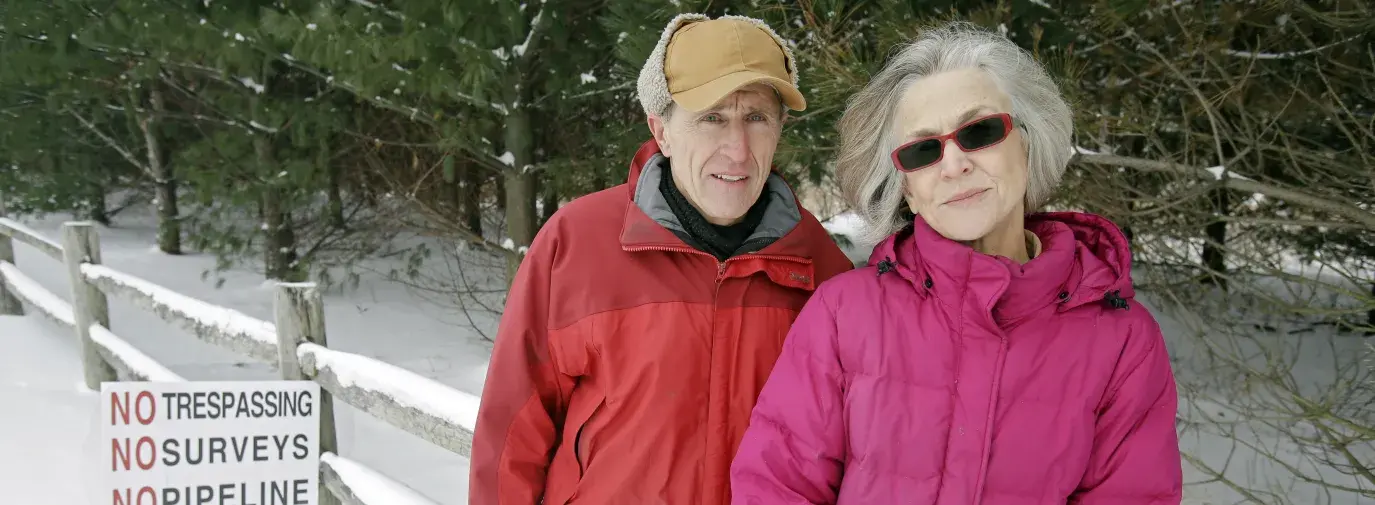
There are “more than 2.5 million miles of pipelines across the US and 18,000 places where they cross under rivers, streams, and lakes,” according to American Rivers. That’s a big concern because accidents happen, and when they do, they often leak poison into US drinking water. In 2015, the Poplar oil pipeline spilled nearly 50,000 gallons of oil into Montana’s Yellowstone River, contaminating water supplies and harming wildlife habitat.
Green America works with a coalition of allies to fight pipelines nationwide, from the Dakota Access Pipeline in North Dakota to the Atlantic Sunrise Pipeline in Pennsylvania, the Keystone XL Pipeline stretching from Canada to Texas, and others.
One thing we love about this coalition is that it brings together a broad swath of people from all walks of life. One of them, Paul Gierosky, is an engineer and business owner who identifies as a conservative. When the Nexus Pipeline—a natural gas pipeline that would run from Ohio to Ontario—was proposed for his area in northern Ohio, Gierosky reached across political lines to help lead his community in opposing it.
Green America’s Tracy Fernandez Rysavy talked with Gierosky about his efforts against the pipeline.
Green American/Tracy Fernandez Rysavy: How did you end up becoming an anti-pipeline activist?
Paul Gierosky: Three years ago, [my wife and I] received a letter from a company called Nexus Gas Transmission, which is owned by Enbridge Energy of Alberta, Canada, and DTE Energy, which is the power generation and distribution company for eastern Michigan. And it says, “We’ve got great news for you! We want to build a 36-inch diameter natural gas pipeline carrying 1.5 billion dekatherms per day 15 feet from your bedroom window!”
And I said, “Over my dead body.”
Northeast Ohio, where I live, is slated to get 100 miles of this pipeline. So, I contacted my neighbors and people throughout Medina County. We created a media outreach plan, had meetings with county leaders, and created a nonprofit. We’ve raised money, hired attorneys, fought lawsuits in public courts. Now we have a case in federal court that’s attempting to expose the abuse of power and law by the Federal Energy Regulatory Commission [FERC].
That’s a five-minute summary of three years.
Green American/Tracy: You describe yourself as a conservative, so what’s it like working with environmentalists, who are often liberal, on this issue?
Paul Gierosky: I just came in from our garden, where I picked tomatoes, chard, and beans grown without pesticides. My wife and I pull the bugs off with tweezers. This whole labeling of people, being something or another is all about party politics, about the establishment. You can call me a conservative. I’m proud of it. I believe in personal responsibility, limited government, free markets, individual liberty, and a strong national defense. But, I am also concerned about our environment, failing public schools, and the conditions in our inner cities.
We’re close to Oberlin, OH, and the university there is really, really, really liberal and part of our coalition. I’ve gone over there many times, and I find the students asking the same kinds of questions I do. At the end of the night, they go, “We want the same things. We just go about it differently.”
Green American/Tracy: What are the impacts that you fear from the Nexus Pipeline?
Paul Gierosky: With interstate natural gas pipelines, there are no safety setback standards. They can literally build it arm’s length from your bedroom window. [According to] the Pipeline and Hazardous Materials Safety Administration, PHMSA, there have been 6,000 reportable pipeline incidents in the US.
In all the [government] regulations, there’s nothing about how close to a house or a school or a church or a nuclear power plant they can build these things. The pipeline companies have lobbied relentlessly to keep out everything like that.
Not having [safety setback standards] is a violation of my Constitutional rights. I’m an engineer besides being a businessman; it makes no sense to have pipelines between houses and within 25 feet of them. Why do we have seatbelts in cars? Because we know there are going to be accidents. Well, we know there will be accidents with pipelines.
Green American/Tracy: You mentioned FERC “abuse”?
Paul Gierosky: The whole FERC process is an elaborate charade. The company picks the project, the company plans the route, FERC collects a whole bunch of data to cover their ass, and they approve the routes and get eminent domain to route it.
I didn’t believe that when I started. I thought, “Here’s a federal government agency that we paid for with our tax dollars that’s going to listen to us. So we have to respect and use the process.”
We never tried to stop the Nexus. Our approach was to reroute it. We said it ought to be going out in the country, away from populated centers where it could have a disastrous effect on people’s lives.
We spent hundreds of thousands of dollars having a fully engineered route proposed. The company dismissed it out of hand. We really thought that because our pipeline route was safer, was less impactful to the environment, that FERC was going to force the company to adopt it. But they didn’t. FERC dismissed it, too.
Every pipeline project proposed has been permitted by FERC. None have been denied. This violates our due-process rights. It’s not a legitimate, real, good-intended process.
Green American/Tracy: How has eminent domain—the right of the federal government to take private property for public use—been an issue in Ohio with Nexus?
Paul Gierosky: Companies use eminent domain as a hammer over your head. For three years, they’ve been holding that over us.
Thousands of miles of pipelines have been built without the use of eminent domain. But those are pipelines that have been only within a state. Intrastate pipelines are regulated by state authorities and public utilities, not the federal government. But Nexus crosses state lines into Canada, so it’s regulated under FERC. Congress passed the Natural Gas Act in 1938 and, later, attached eminent domain authority to it for FERC without restriction.
The Nexus pipeline is an export pipeline. We’re shipping our natural resources to Canada. We have a foreign Canadian company that’s the lead developer. So it’s planning to use eminent domain to take our property to export product to Canada that Canada doesn’t even need. We import gas from Canada, so why the hell does FERC have the legal authority to give away eminent domain authority to a private company that clearly has no public use?
Green American/Tracy: What’s the status of the pipeline now?
Paul Gierosky: FERC issued its third permit for the Nexus pipeline in November 2016. From that point, it had 90 days to go through an evaluation process before the commissioners would issue a certificate, but there was a long delay because one of the FERC commissioners resigned in February, leaving FERC without a quorum. They needed three to conduct business, and after the resignation, there were only two.
During that intervening period, we fired up a team of attorneys, and on May 12th, we filed our federal lawsuit in the District Court of the Northern District of Ohio, which is pending before Judge John Adams. (I love that name.) We’re requesting that the judge issue a stay to stop FERC from issuing a certificate on Nexus until the merits of our case can be heard.
In August, the Senate confirmed two Trump nominees to FERC, restoring the quorum. They didn’t waste any time issuing the certificate. The court has not yet ruled on our complaint. I suspect the judge now has his justification to dismiss our case. We will see.
Green American/Tracy: Have you had any victories yet?
Paul Gierosky: Oh, yes! In common pleas court, a judge denied the company the power to use Ohio revised codes, laws created in Ohio, to survey property without homeowners’ permission.
Here’s why that matters: The company sends a letter and says, “Good news! We want to build this monster through your front yard. Please sign here, so we can come survey your property.”
And you deny, deny, deny. Then they send letter again and say,”If you don’t send it back, we’re going to take you to court.” So, when you tell them to go you-know-what, they file a lawsuit, which usually names a whole bunch of property owners who have denied them access. They did that here in 11 counties.
Can you imagine this? In some counties in Ohio, judges have granted temporary restraining orders, and police have accompanied surveyors and held property owners at bay while their property was seized. They can cut down trees, take data, dig holes, take soil samples. And they give you no results. How does that comport with the fifth amendment? How about if they come and tap into my brain and seize my intellectual property?
Anyway, we fought that here in Medina County—94 people got sued and were dragged into court. It’s been going on for over a year. A couple of weeks ago, the court said, “You know what? The courts have been in error in applying Ohio revised code. So we’re denying the company this right to do that.”
This is precedent-setting. Now the company is appealing it, because if this goes into effect, it changes the whole dynamic. If they can’t survey your property, they can’t come up with a route.
Green American/Tracy: How do you stay hopeful you can stop Nexus’s current route and FERC abuses?
Paul Gierosky: Because I’m a marathoner. I ride my bike 100 miles for fun. And we’re not alone in this process. There are 200 organizations—Green America is part—that have called upon Congress to hold hearings into FERC’s abuse of power and law. Every two weeks, we have a conference-call strategy session. We come up with plans, have Senate call-in days, draft legislation, etc.
Why am I hopeful? Because I’ve yet to meet anybody who says what we’re doing is crazy or wrong. I just know we’re right, and this process should be changed.
Take Action
In partnership with a national coalition of anti-pipeline groups, Green America has been pushing back against FERC’s abuses, particularly through calling, e-mailing, and lobbying members of Congress to act on this matter. We also sent a letter to FERC in May asking it to reject the Eastern Panhandle Pipeline Expansion Project, which is still pending.
To keep informed about Green America’s work to stop pipelines and end FERC abuses, visit our Climate programs page and sign up for our free e-mail newsletter.







